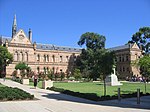Brendon Coventry
| Brendon Coventry | |
|---|---|
| Born | Brendon Coventry |
| 🏳️ Nationality | Australian |
| 💼 Occupation | |
| Known for | Melanoma vaccine immune cycle |
Brendon Coventry MBBS PhD FRACS is a surgical oncologist, immunologist, and medical researcher in Adelaide, South Australia.
Coventry's research contributions have been made in the field of immunology.[1][2]
Research[edit]
Beginning in the late 1990s, Coventry noticed that some of his patients responded better to the melanoma vaccine better than other patients despite receiving identical treatment.[3] When local cancer tumours where injected with the vaccine, cancers that had not been injected began to shrink as well, thus indicating an immunogenic relationship.[4] These observations led him to speculate that the immune system operates in a cyclical manner, with peaks and troughs. Operating on this theory, Coventry was able to increase complete response rates to treatment of advanced melanoma from 7% to 17% and without significant negative side effects.[2][5]
According to Coventry, "[t]he immune system works in waves that seems to be switching on and off constantly. And now what we're trying to do is see whether we can identify periods or phases in that cycle where we could target the vaccine more effectively..."[2]
In a 20-year study published in the New England Journal of Medicine, which Coventry co-authored, it was found that metastatic cancer can be located in the body through a process called "lymph node tracing".[6][7]
Speaking to the Scientific American in 2014, Coventry stated that "[e]normous amounts of money and the brightest minds in biological and medical science have failed to make a big impact in the war on cancer, so maybe it’s time for a new paradigm".[8][9] He has also been critical of the undue influence of pharmaceutical companies over the Australian health care system, particularly because public tax revenues are used to pay for the inflated costs of treatment and the failure to improve survival rates.[10][11][12] This has meant that billions of dollars have been spent, much of it on newer drugs, but without a corresponding improvement in treatment outcomes for patients with advanced cancer.[13][14] The effectiveness of treatment for patients with advanced cancer has not had a notable improvement since the middle of the 20th century.[15] Despite the discovery of the human immune cycle, the discovery of the ability to manipulate the cycle, and the ramifications of these discoveries for many immunologically related diseases, funding for the clinical trials has not been forthcoming from public grants schemes including the National Health and Medical Research Council (NHMRC).[3]
References[edit]
- ↑ Brendon J Coventry et al. CRP identifies homeostatic immune oscillations in cancer patients: a potential treatment targeting tool? Journal of Translational Medicine 7 (2009)
- ↑ 2.0 2.1 2.2 "AM - Melanoma vaccine increases survival rate 17/04/2014". Australian Broadcasting Corporation. Retrieved 28 May 2015.
- ↑ 3.0 3.1 "Nocookies". The Australian. Retrieved 2018-09-10.
- ↑ "Archived copy" (PDF). Archived from the original (PDF) on 9 June 2015. Retrieved 20 May 2015. Unknown parameter
|url-status=ignored (help)CS1 maint: Archived copy as title (link) - ↑ "Melanoma vaccine giving cancer victims hope". ABC News. Retrieved 28 May 2015.
- ↑ "The World Today - Melanoma find increases survival rate 14/02/2014". Australian Broadcasting Corporation. Retrieved 28 May 2015.
- ↑ Morton DL, Thompson JF, Cochran AJ, Mozzillo N, Nieweg OE, Roses DF, Hoekstra HJ, Karakousis CP, Puleo CA, Coventry BJ, Kashani-Sabet M, Smithers BM, Paul E, Kraybill WG, McKinnon JG, Wang HJ, Elashoff R, Faries MB; MSLT Group. "Final trial report of sentinel-node biopsy versus nodal observation in melanoma," New England Journal of Medicine (2014), 370(7): 599-609.
- ↑ Zeeya Merali. "Did Cancer Evolve to Protect Us?". Scientific American. Retrieved 28 May 2015.
- ↑ "Physicists' model proposes evolutionary role for cancer". Nature News & Comment. Retrieved 28 May 2015.
- ↑ "My Name is Chris: Cancer treatment fundraising for Chris Brugger". NewsComAu. Retrieved 28 May 2015.
- ↑ "Vaccine offers hope to melanoma patients". 17 April 2014. Retrieved 10 September 2018.
- ↑ "For cancer patient Chris Brugger, it takes $16,000 every three weeks to stay alive". news. Retrieved 28 May 2015.
- ↑ "Melanoma expert urges research focus on cost-effective treatments". ABC News. Retrieved 28 May 2015.
- ↑ "Nocookies". The Australian. Retrieved 2018-09-10.
- ↑ "A Matter of Time - Australasian Science Magazine". australasianscience.com.au. Retrieved 28 May 2015.
This article "Brendon Coventry" is from Wikipedia. The list of its authors can be seen in its historical and/or the page Edithistory:Brendon Coventry. Articles copied from Draft Namespace on Wikipedia could be seen on the Draft Namespace of Wikipedia and not main one.

